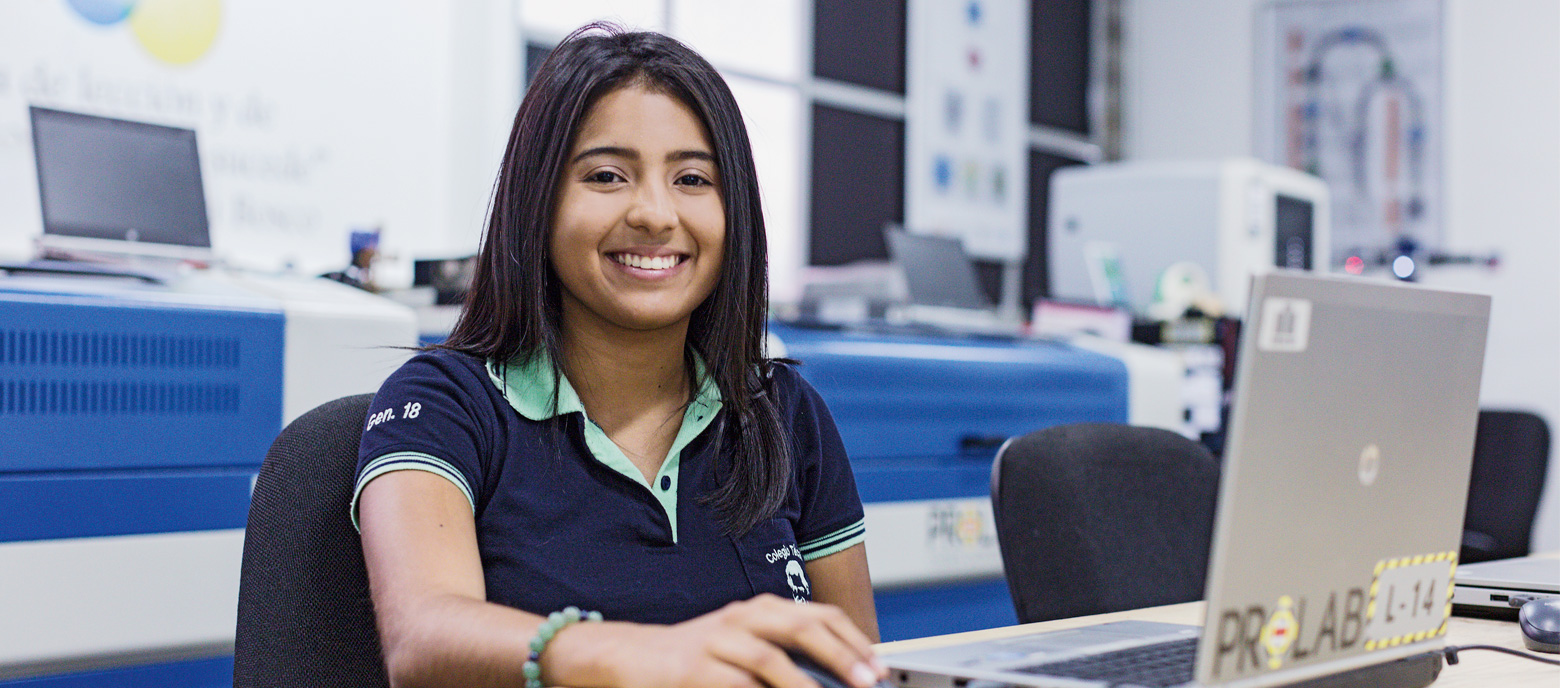Perspectives
Improving knowledge
‘I really love electromechanics, even though it’s a male-dominated area.’
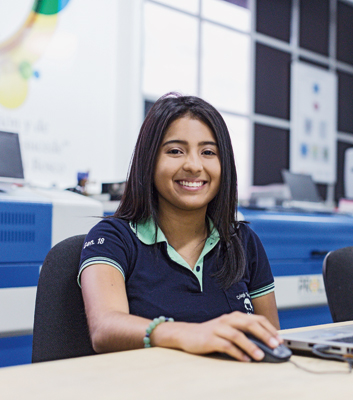
‘I specialise in electromechanics, and that’s a pretty male-dominated area. There are three girls and 16 boys on my course. But that doesn’t bother me; I’m fascinated by the subject. Mind you, it can be tough being a young woman in the electromechanical field. Even my parents thought it was an odd choice to start with. But I really love it. One day, I want to be out working in big plants, not stuck in an office. I’d really like to work with big electric motors or power plants and systems. I’m also currently planning to go to university. I’d like to study either mechatronics or electrical engineering. I’ve already made enquiries at two universities. The great thing about our school is that it opens lots of doors and we get really comprehensive training. I went on a two-week student exchange with a school in Chicago in the USA. We’ve also been on trips to environmental protection projects. We’re really widening our horizons. And the fees are very reasonable for a private school: my parents can just about afford the fees of 60,000 Costa Rican colones (around EUR 90) a month. And the school keeps the costs of excursions and other parts of the course relatively low.’ —
‘Our qualifications open doors to many companies for our young people.’
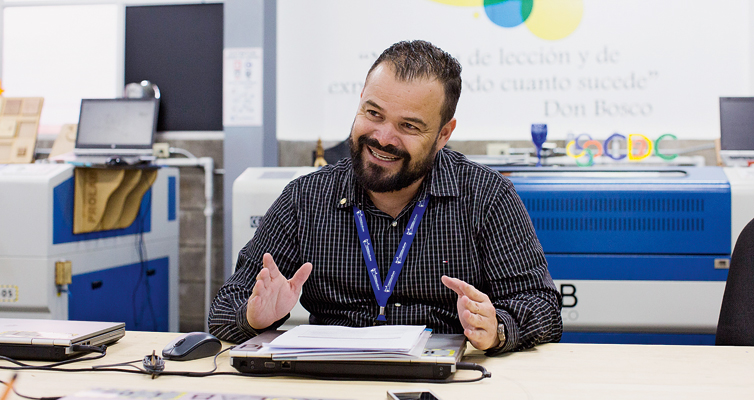
‘Our additional qualification – the “Diplomado” – gives our students an edge on the labour market. The young women and men may not be qualified engineers, but they have built up a lot more knowledge than skilled workers. They are better prepared than their peers for employment. You could describe them as qualified skilled workers. And that has opened the doors of many companies to them. 82 per cent of our former students have found jobs. It doesn’t even take them long to produce prototypes for industry as part of digital manufacturing. Most of our students are from modest backgrounds, so our training has a considerable social impact too. Many of our former students are earning more at age 20 than their parents do. That means they can help boost the family’s income and also make a long-term contribution to improving the area where they live. Our cooperation with GIZ was about much more than just the financial element and providing equipment for the laboratory. GIZ also played an active part in developing the project. I was impressed by that – and above all, it was fun.’ —
‘I’m really keen to carry on learning.’
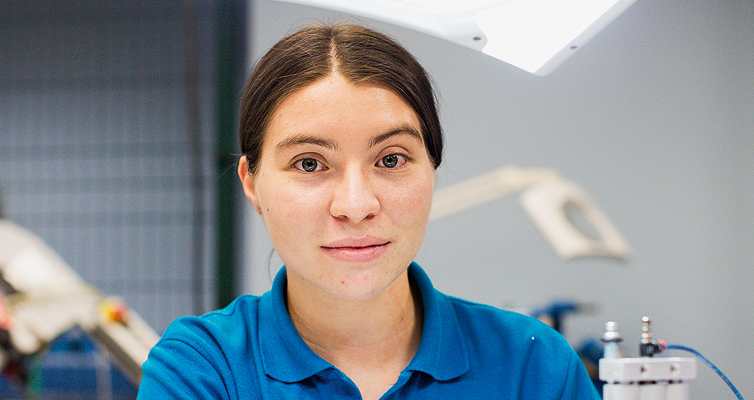
‘At the end of 2015, I started as an intern at MicroVention. In early 2016, the company then took me on permanently. Today, I am a trained precision mechanic/technician and industrial designer in the Tool Shop, where I realise the engineers’ and machine operators’ ideas on the computer. I’m the only industrial designer in the department, so I cooperate very closely with my colleagues. They tell me what they need, and I devise and design a solution on the computer. My role is to turn their ideas into something useful and above all buildable. And I usually have to work quickly, because people need solutions to problems that arise unexpectedly. The training I had at the Colegio Técnico Don Bosco and my additional training as an industrial designer specialising in digital manufacturing have been a huge help. Now I can combine technical skills with creative work. And I’m really keen to learn more. I’m now studying mechanical engineering, and one day I’d like to set up my own company. I work 30 hours a week and spend the rest of my time studying. As a part-time employee, I’m earning USD 120 a week. I still live at home, so I can spend some of that money as I choose. One day I’d love to do something with renewable energy. After all, Costa Rica has a wealth of alternative sources of energy.’ —
‘Germany’s dual training system is a model for success.’
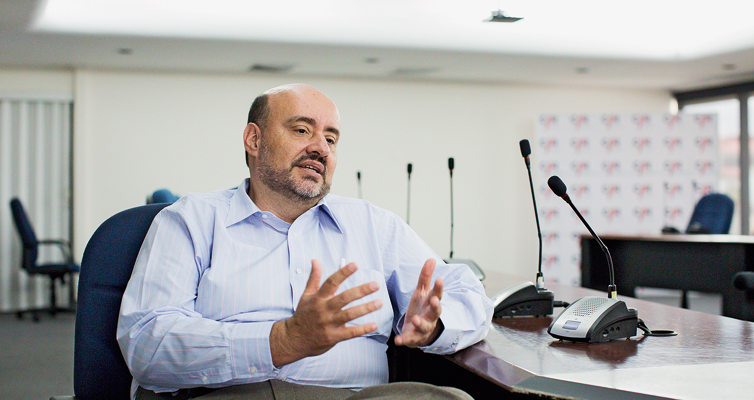
‘We find the idea of the training provided at the CEDES vocational school an excellent model and would like to replicate it elsewhere – theoretical training, followed by an internship that often enables successful students to find a good job. It helps raise family incomes and improve people’s social situation. What we really value about our cooperation with GIZ is the knowledge transfer. Participants acquire expertise that would be difficult to acquire in other ways. Those of us working at the Chamber of Industry have looked at a lot of other countries, including Taiwan. We found many good models, but Germany’s dual training system is a model for success. One major plus of the project is the laboratory equipment and the machines. However, even excellent equipment is useful only if people know how to operate it. The project is a win-win situation – for us, for the company owners and especially for the CEDES students. Here in Costa Rica, business owners are aware of their corporate social responsibility. That’s why we made the Colegio Técnico Don Bosco our Chamber’s social project. Over the past 20 years, we have supported it with training and teaching materials and direct funding to the tune of USD 25 million.’ —

THE PROJECT IN FIGURES
7,600 young people
attended FACILIDAD training programmes.
For 3,000 individuals
the employment situation has improved.
53 per cent
of them are women.
published in akzente 4/18
